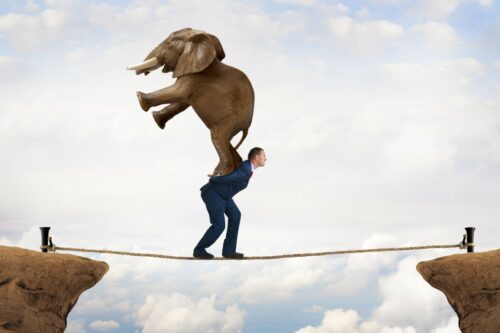Life sucks sometimes. Plain and simple. You can be going along thinking life is wonderful and then, boom—someone pulls the rug out from under you. We can’t avoid it, but we can decide how we respond to it. In difficult situations, many people use the common sayings “when life gives you lemons, make lemonade,” or “learning to dance in the rain.” While both of those sentiments are nice, what if you don’t like lemonade? Or what if you just want to be dry (and I don’t mean abstaining from wine)?

Let’s face it, no matter how prepared you are or how many plans you have—A, B, C, D, or even Z—in your back pocket, things happen that just upset the status quo. No matter what you do and how hard you try, there is always the possibility of having a mishap that knocks you off track. When this happens, it can result in a downward spiral that makes everything seem difficult. This deep decline can make you feel like hiding away from the world, like there is no way out, and like it’s not worth trying anymore.
While it’s impossible to stop health issues and difficult times from happening, there are more resources available to you now than any time before (the internet is good for some things!). In this article, we’ll share some of the most useful health tools and resources to help you stave off these difficult times and feelings of despair, and to help you to get back in the saddle.
Mental Health Resources and Tools
When things get really difficult, it isn’t only harder on your body, but it’s also hard on your mind. That’s why mental health resources and tools are incredibly important to make use of. Many times, the first step toward getting back on track happens in the mind.
Difficult situations lead us to become stressed and anxious because we aren’t used to not being able to do something or feeling this way. We need to first make ourselves realize and understand that that is OKAY! Focusing on our mindset will allow us to build the foundation and prepare ourselves to counter these difficult times. Some of the best resources and tools that can help with mental health include:
- Emergency Help – If you ever feel truly hopeless, it may be time to get help now by reaching out to the National Suicide Prevention Lifeline at 1-800-273-8255 or contacting the Substance Abuse and Mental Health Service Administration’s National Helpline at 1-800-662-4357.
- Baby Steps – Do something or anything that you can do to try to stop the downward spiral. Then take baby steps in the direction of upward spiraling, as opposed to continuing down. But what does that actually look like? Well, if you are indeed in a downward spiral, what would someone you admire do? Think of someone who has their act together and put them in your situation, then do what you think they would do.
Pick one thing in the direction you want to go. For example, maybe you are afraid to get COVID-19 so much you don’t want to go out and you are concerned people will judge you if you wear a mask. What would a cautious person do to protect themselves and yet still go out? Maybe pick outside activities that would have limited people around. Here is the kicker, it is the planning and looking for the activity that is the first step, not the doing it. The second step might be to pick your clothes out, choose a high-quality N95 mask, then the 3rd step would be ordering it.
- Meditation and Mindfulness Apps – Meditation and mindfulness apps are great tools to help you de-stress, focus on your breathing, and center yourself. This helps to provide clarity in our busy lives that usually don’t offer us any time to ourselves. These apps will help you to calm yourself and your negative thoughts, and teach you to let go of the things you can’t control. You can also find breathing, meditation, and mindfulness videos on YouTube that make it easy to get started right away!
- Get Help From Others – When things get difficult, you can also get help from other people to get you on the right path again. This doesn’t necessarily mean going to see a therapist—although that would be a great resource to make use of—as there are now programs, forums, groups, messaging services, chats, and more available to you. These tools allow you to talk about how you feel and get help from others who understand the difficulty of what you are going through.
Physical Health Resources and Tools
Working on your mental health to set intentions and change your perception of the situation is a critical first step toward staving off a downward spiral, but your situation probably all started due to an injury, limitation, issue, or chronic condition affecting your physical body.
While there are a variety of different physical health resources and tools out there, it is important to always remember to start slow and only do what you are able to. You want to achieve the “Goldilocks zone” by choosing activities that challenge you, but don’t cause a flare-up of your condition. Build a foundation of things that push you, but that you can do comfortably. Then, look for activities that raise the bar from there. Here are some of the resources and tools to help you on your way:
- Exercise Planners and Diaries – Similar to dietary plans and trackers, there are also exercise planners that allow you to build an exercise plan based on your needs. Then, you can use an exercise diary to keep track of your progress and your improvement over time. This is a great way to help you stay motivated and working toward your goal.
- Fitness Technology – Making use of technology will also help you on your path to recovery. There are many different items that are helpful, including smartwatches, step counters, sleep monitors, calorie counters, and more. Most smartwatches include many of these different tools in one piece of technology, and also offer a simple way to remind yourself to do things like stand up, drink water, walk around, and exercise.
- Coaches and Physical Therapists – Other great resources and tools are licensed coaches and physical therapists. These individuals can help to take away all the stress of determining your best course of action. They will review your situation and come up with a customized plan built just for you to help you get back on track at your own pace.
- Exercise Classes and Programs – There are also thousands of exercise classes and programs that are available to help you as you work your way back—both in-person and online. You can find an endless number of videos on YouTube to help with general exercises or specialized fitness videos addressing your specific problem. If you’d rather work with someone and have them guide you, you can get in touch with gyms, clinics, and other organizations that will help you get active again, even when it’s difficult. You can even reach out to us at Life Energy Foundation to get help right away!
At Life Energy Foundation (LEF), we want to help you get moving again and overcome any biomechanical challenges you face. We can assist you on your journey by providing you with valuable resources and tools, as well as all the support you need. We have over 25 years of experience transforming lives and, when you are ready, we are here to help you transform yours as well. Take the first step today with our free 30 Days to Better program, which includes exercises, meditation, and other tools!

